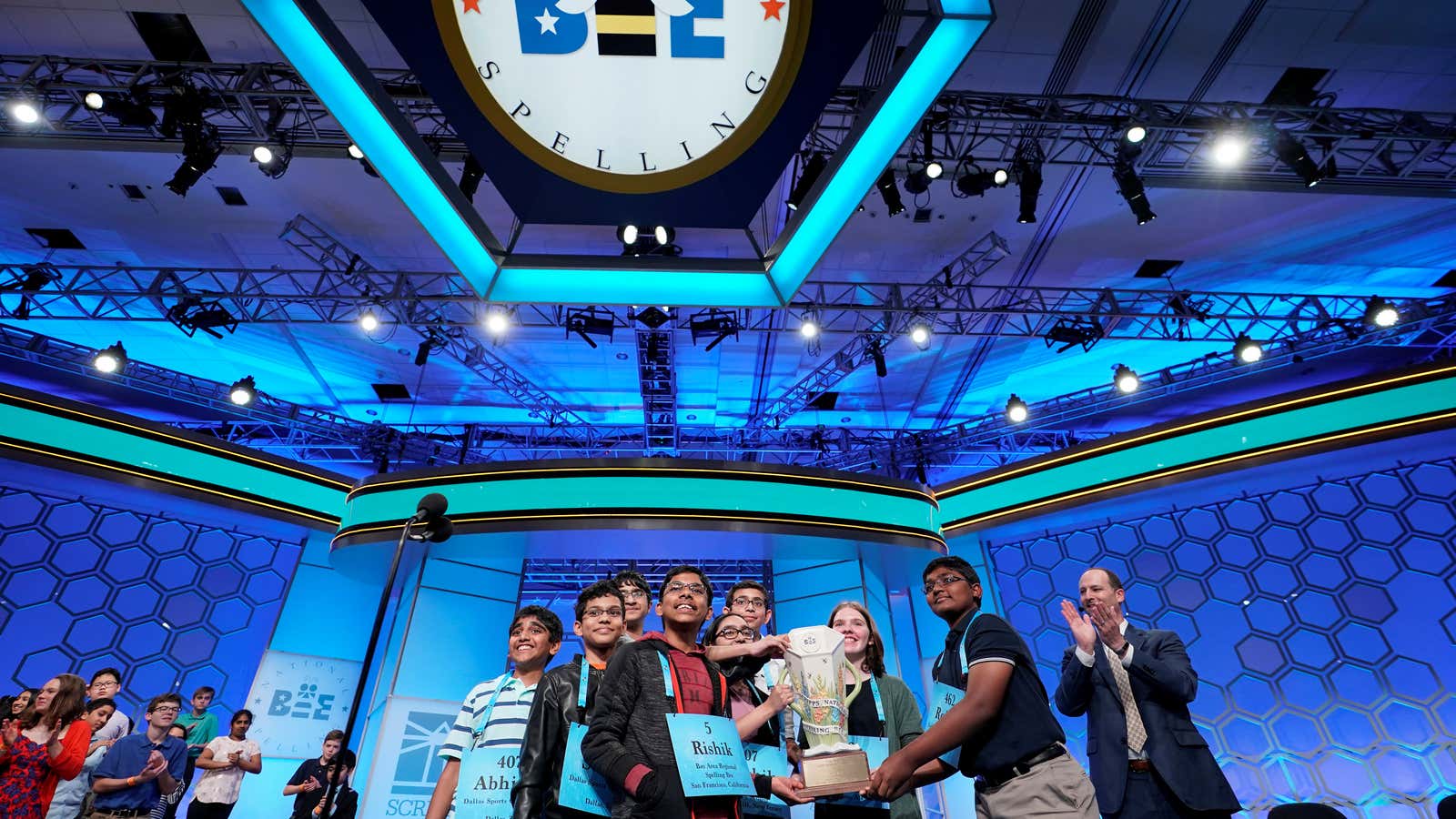America’s notoriously difficult Scripps National Spelling Bee has a new winner. Well, eight, actually.
Just after midnight today (May 31), eight competitors were declared co-champions in an eight-way tie—unprecedented in the event’s 94-year history. Each of them had spelled the 47 words correctly in five consecutive perfect rounds. They will each go home with winnings of $50,000.
America’s best new spellers of 2019, all aged between 12 and 14, are: Rishik Gandhasri, Erin Howard, Saketh Sundar, Shruthika Padhy, Sohum Sukhatankar, Abhijay Kodali, Christopher Serrao, and Rojan Raja.
Indian media reported that all but one of the winners were of Indian descent, though Quartz could not independently verify the origins of all the finalists. It would extend an impressive15-year streak of Indian-Americans claiming the Spelling Bee crown, and also means that 25 of the past 29 champions are Indian-American. This dominance of Indian-Americans on spelling scene has flummoxed viewers. A recent documentary, Breaking the Bee, took a deep dive into why Indian-Americans are such incredible spellers and discovered a confluence of champion-making factors.
The field was so good this year that organizers had to improvise new rules on the spot. More than four hours into the finals and at the conclusion of the 17th round—the second consecutive round with no eliminations—the organizers acknowledged that they had run out of difficult words.
“We’re basically throwing the dictionary at you,” Jacques Bailey, the official pronouncer, said after the 17th round. “And so far you’re showing the dictionary who’s boss.”
“Champion spellers, we are in uncharted territory,” he continued. “We do have plenty of words remaining on our list, but we’ll soon run out of words that can possibly challenge you, the most phenomenal assemblage of super spellers in the history of this competition.”
As viewers across the US watched the contestants spell out increasingly fiendish words, Merriam-Webster, the dictionary, saw an uptick in obscure words being searched on its website.
We looked up the definitions for you.
auftaktigkeit (noun). Principle in music: all musical phrases begin on an upbeat
karmadharaya (noun). A class of compound words typically having a noun as second constituent and a descriptive adjective as first constituent (as bluegrass, blackberry), a noun as second constituent and an attributive noun as first constituent (as houseboat), or an adjective as second constituent and an adverb as first constituent (as everlasting, widespread) and having meanings that follow the formula “a B that is A ” for nouns or “B in the manner expressed by A ” for adjectives, where A stands for the first constituent and B for the second
thymele (noun). An ancient Greek altar.
tjaele (noun). Frozen ground.
jindyworobak (noun). One of a group of strongly nationalistic Australians seeking to promote native ideas and traditions especially in literature
huanglongbing (noun). A citrus greening disease.
omphalopsychite (noun). One who stares fixedly at his navel to induce a mystical trance —often used of the hesychasts.
Roskopf (noun). A watch with a barrel whose diameter is greater than the radius of the watch.
rhathymia (noun). The state of being carefree; light-heartedness
urfirnis (noun). A lustrous paint varying from black to red and found on some prehistoric Greek pottery
limitrophe (adjective). Situated on a border or frontier; adjacent.
hochmoor (adjective). Being or growing on various acid peats or peaty soils.
